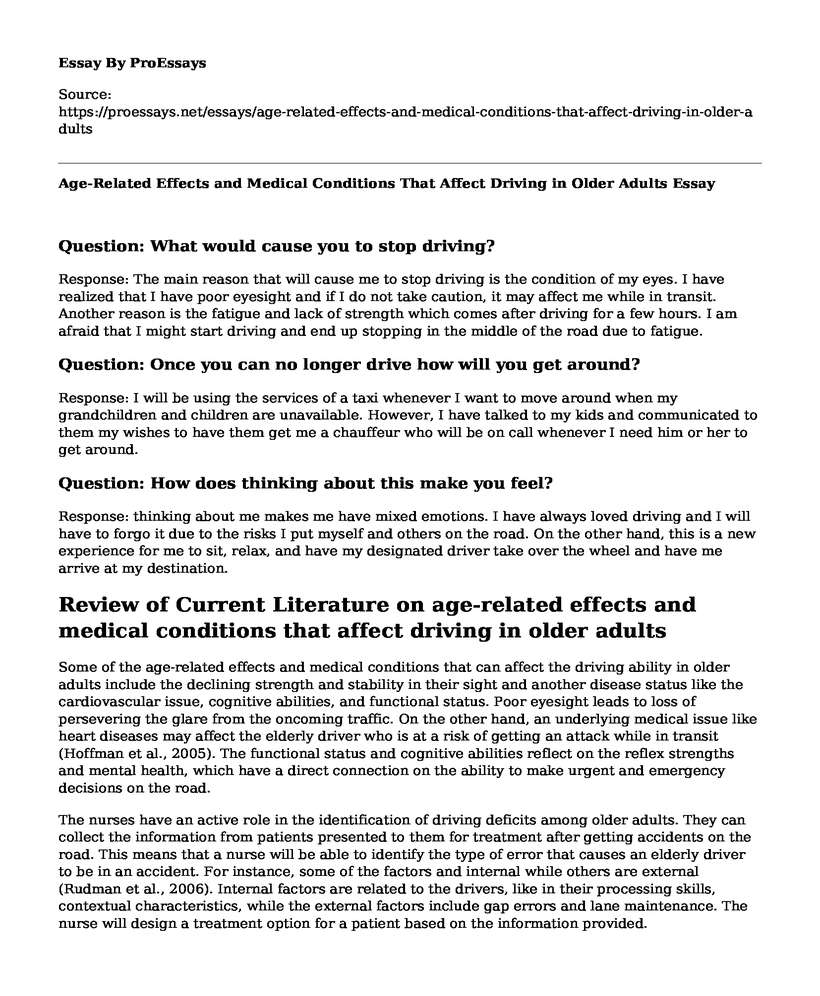Question: What would cause you to stop driving?
Response: The main reason that will cause me to stop driving is the condition of my eyes. I have realized that I have poor eyesight and if I do not take caution, it may affect me while in transit. Another reason is the fatigue and lack of strength which comes after driving for a few hours. I am afraid that I might start driving and end up stopping in the middle of the road due to fatigue.
Question: Once you can no longer drive how will you get around?
Response: I will be using the services of a taxi whenever I want to move around when my grandchildren and children are unavailable. However, I have talked to my kids and communicated to them my wishes to have them get me a chauffeur who will be on call whenever I need him or her to get around.
Question: How does thinking about this make you feel?
Response: thinking about me makes me have mixed emotions. I have always loved driving and I will have to forgo it due to the risks I put myself and others on the road. On the other hand, this is a new experience for me to sit, relax, and have my designated driver take over the wheel and have me arrive at my destination.
Review of Current Literature on age-related effects and medical conditions that affect driving in older adults
Some of the age-related effects and medical conditions that can affect the driving ability in older adults include the declining strength and stability in their sight and another disease status like the cardiovascular issue, cognitive abilities, and functional status. Poor eyesight leads to loss of persevering the glare from the oncoming traffic. On the other hand, an underlying medical issue like heart diseases may affect the elderly driver who is at a risk of getting an attack while in transit (Hoffman et al., 2005). The functional status and cognitive abilities reflect on the reflex strengths and mental health, which have a direct connection on the ability to make urgent and emergency decisions on the road.
The nurses have an active role in the identification of driving deficits among older adults. They can collect the information from patients presented to them for treatment after getting accidents on the road. This means that a nurse will be able to identify the type of error that causes an elderly driver to be in an accident. For instance, some of the factors and internal while others are external (Rudman et al., 2006). Internal factors are related to the drivers, like in their processing skills, contextual characteristics, while the external factors include gap errors and lane maintenance. The nurse will design a treatment option for a patient based on the information provided.
Interventions that nurses can adopt include the prescription of a rehabilitation program and recommend the elderly driver to adopt other methods of transportation (Classen et al., 2010). The rehabilitation program helps correct the internal factors that affect the driver which increases the possibility of causing an accident. For instance, the rehabilitation might teach the adults ways of coping with the changes taking place in their body. The seat may be adjusted so that a driver can see ahead which will reduce the gap errors on the road. On the other hand, a patient may need to adopt other methods of transport if the accidents and incidents on the road are constant, and rehabilitation programs have failed. This will ensure that the elderly driver is safe as another person drives them around. For instance, one can make arrangements with the public or private transport system or have a family member take over.
References
Classen, S., Shechtman, O., Awadzi, K. D., Joo, Y., & Lanford, D. N. (2010). Traffic violations versus driving errors of older adults: Informing clinical practice. American Journal of Occupational Therapy, 64(2), 233-241.
Hoffman, L., McDowd, J. M., Atchley, P., & Dubinsky, R. (2005). The role of visual attention in predicting driving impairment in older adults. Psychology and aging, 20(4), 610.
Rudman, D. L., Friedland, J., Chipman, M., & Sciortino, P. (2006). Holding on and letting go: The perspectives of pre-seniors and seniors on driving self-regulation in later life. Canadian Journal on Aging/La Revue canadienne du vieillissement, 25(1), 65-76.
Cite this page
Age-Related Effects and Medical Conditions That Affect Driving in Older Adults. (2022, Jun 06). Retrieved from https://proessays.net/essays/age-related-effects-and-medical-conditions-that-affect-driving-in-older-adults
If you are the original author of this essay and no longer wish to have it published on the ProEssays website, please click below to request its removal:
- Health Insurance Plans and Their Impact on the United States Essay Example
- Essay Sample on Community Health Systems
- Essay Sample on The Ideal Love
- Essay on Unconditional Love Beyond Blood Ties: A Story of My Life
- Paper Example on IQ Score Variance in Student: Case Study
- Essay on COPD: A Life-Threatening Condition Affecting Millions Worldwide
- Essay Example on California Psychological Inventory (CPI) Assessment: Enhancing Performance







